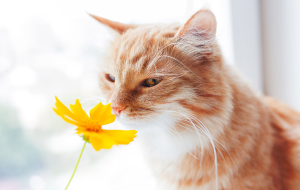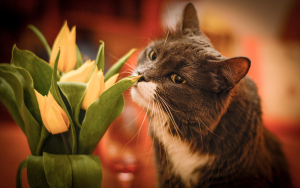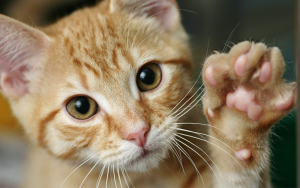Why is My Cat Sneezing? Understanding Causes, Symptoms, and Solutions

If you’ve ever heard your cat sneezing, you may have wondered whether it’s something to be concerned about or just a harmless occurrence. While the occasional sneeze can be normal, frequent or severe sneezing could be a sign of an underlying health issue.
Understanding the causes of sneezing in cats, recognizing associated symptoms, and knowing how to respond can help ensure your feline friend stays healthy and happy.
In this article, we’ll explore why cats sneeze, common causes, symptoms to watch for, and the best ways to care for your sneezing cat.
What is Sneezing in Cats?
Sneezing is a reflex action that helps clear the nasal passages of irritants like dust, allergens, or mucus. It involves a forceful exhalation of air through the nose and mouth, often accompanied by a sound. Sneezing in cats is a common occurrence, but
when it becomes persistent or is accompanied by other symptoms, it may indicate a health issue that requires attention.
Common Causes of Sneezing in Cats
Several factors can trigger sneezing in cats. Some are relatively harmless, while others may indicate an illness or condition that needs veterinary care. Here are some of the most common causes:
1. Allergies
Cats, just like humans, can develop allergies to a variety of substances. Sneezing is one of the common signs of an allergic reaction in cats. Some common allergens include:
- Dust and pollen – Often present in the home environment, these can irritate your cat’s nasal passages.
- Perfumes and scented products – Many household cleaning products, air fresheners, or perfumes can trigger sneezing.
- Food allergies – Though less common, some cats may have sensitivities to specific ingredients in their diet, leading to sneezing.
- Fungal spores – Molds and fungi can cause allergic reactions in sensitive cats.
If allergies are suspected, the sneezing is often accompanied by watery eyes, itching, and general discomfort. It’s important to eliminate potential allergens and consult a vet for appropriate treatment options.
2. Respiratory Infections
Respiratory infections are one of the most common causes of sneezing in cats. These infections can be viral, bacterial, or fungal in nature. The most prevalent respiratory infections in cats include:
- Feline herpesvirus (FHV-1) – This viral infection is highly contagious and often causes sneezing, runny nose, and conjunctivitis. It is one of the leading causes of upper respiratory infections in cats.
- Calicivirus – Another viral infection that can lead to sneezing, ulcers in the mouth, and sometimes fever.
- Bacterial infections – Secondary bacterial infections can occur as a result of a viral infection or due to other environmental factors.
- Fungal infections – Fungal spores can irritate the nasal passages, leading to sneezing, congestion, and nasal discharge.
In most cases, respiratory infections are accompanied by other symptoms, including nasal discharge, coughing, lethargy, loss of appetite, and fever. These infections can be contagious to other cats, so it’s important to isolate the affected animal and
seek veterinary care.
3. Foreign Objects in the Nose
Sometimes, cats will sneeze due to a foreign object, such as a piece of grass, dust, or even a small toy, becoming lodged in their nasal passages. The body attempts to expel the object through sneezing. If the object is small and non-harmful, it may eventually
be expelled naturally. However, larger or more stubborn objects can cause discomfort and require veterinary intervention to remove.
4. Dental Issues
Believe it or not, dental problems can also lead to sneezing in cats. The roots of a cat’s teeth are located close to the sinuses, and infections or abscesses in the teeth can lead to sinus congestion and sneezing. Infected teeth, especially in older
cats, can cause persistent sneezing as well as foul-smelling breath, drooling, and difficulty eating.
If you notice that your cat’s sneezing is accompanied by issues with eating or strange mouth odors, a dental checkup is in order.
5. Environmental Irritants
Cats are naturally curious creatures, and exposure to certain environmental irritants can trigger sneezing. Some common irritants include:
- Strong odors – Things like cigarette smoke, incense, cleaning products, or cooking smells can irritate a cat’s sensitive nose.
- Chemicals – Pesticides, fertilizers, or air fresheners can trigger sneezing in cats.
- Toxins – Exposure to toxic substances like certain plants (e.g., lilies), household cleaners, or even medications can cause sneezing along with more severe symptoms.
If you suspect your cat’s sneezing is due to an environmental irritant, consider eliminating the irritant and monitoring your cat’s symptoms closely.
6. Dry Air
Dry air, especially in the winter months or in air-conditioned environments, can dry out your cat’s nasal passages and lead to sneezing. This is particularly common in homes that use heating systems during colder months. If your cat’s sneezing is related
to dry air, using a humidifier or placing a bowl of water near a heat source may help keep the air moist and reduce sneezing.
7. Nasal Polyps or Tumors
Though less common, nasal polyps or tumors can also cause sneezing in cats. These growths can obstruct the nasal passages and lead to chronic sneezing, along with nasal discharge, congestion, and sometimes even changes in breathing patterns. If your cat’s
sneezing persists despite other treatments, or if it is accompanied by blood in the discharge, it’s essential to seek veterinary care for a thorough examination.
Symptoms to Watch For
While occasional sneezing isn’t usually a cause for concern, there are certain symptoms that, when present alongside sneezing, should prompt a visit to the vet. These include:
- Persistent or severe sneezing – If your cat sneezes multiple times per hour or the sneezing is particularly forceful, it may indicate a more serious issue.
- Nasal discharge – Clear, watery discharge may indicate an allergy, while thick, green, or yellow discharge could suggest an infection.
- Loss of appetite – A decrease in appetite, especially if your cat is also lethargic, can indicate illness.
- Coughing or wheezing – These symptoms may indicate a more severe respiratory issue or infection.
- Fever – A raised body temperature could be a sign of infection or inflammation.
- Changes in behavior – If your cat becomes unusually quiet, withdrawn, or stops grooming, it’s important to seek professional advice.
What to Do If Your Cat Is Sneezing
If your cat has started sneezing and you’re unsure of the cause, here’s what you can do:
- Observe and Monitor – Take note of how often the sneezing occurs and any accompanying symptoms. This will help your vet diagnose the issue.
- Eliminate Potential Irritants – Remove any known allergens or irritants from the environment, such as perfumes, smoke, or strong cleaning products.
- Keep Your Cat Hydrated – Make sure your cat is drinking plenty of water, especially if they have nasal congestion.
- Consult Your Veterinarian – If the sneezing continues or is accompanied by other concerning symptoms, it’s time to visit the vet. They may perform tests to rule out infections, allergies, or more serious conditions.
- Provide Comfort – If your cat has a cold or respiratory infection, keep them warm, comfortable, and in a quiet environment to help them recover.
Conclusion
While sneezing in cats is usually a harmless reflex, persistent or severe sneezing can indicate a variety of underlying issues, from allergies and infections to more serious conditions like tumors or dental issues. By paying attention to your cat’s symptoms
and seeking veterinary care when needed, you can ensure that your feline friend stays healthy and comfortable.
If your cat’s sneezing seems to persist despite simple remedies, don’t hesitate to consult a veterinarian to rule out any serious conditions. The key to keeping your cat happy and healthy is early detection and proper care.
For pet owners seeking to monitor their cat’s health more effectively, tools like PettureX, a comprehensive pet health management app, offer AI-driven solutions for tracking symptoms like sneezing, providing personalized care advice,
and helping ensure your cat receives the right treatment when it’s needed most.
By being proactive and vigilant about your cat’s health, you can help ensure a long, happy life for your feline companion!







